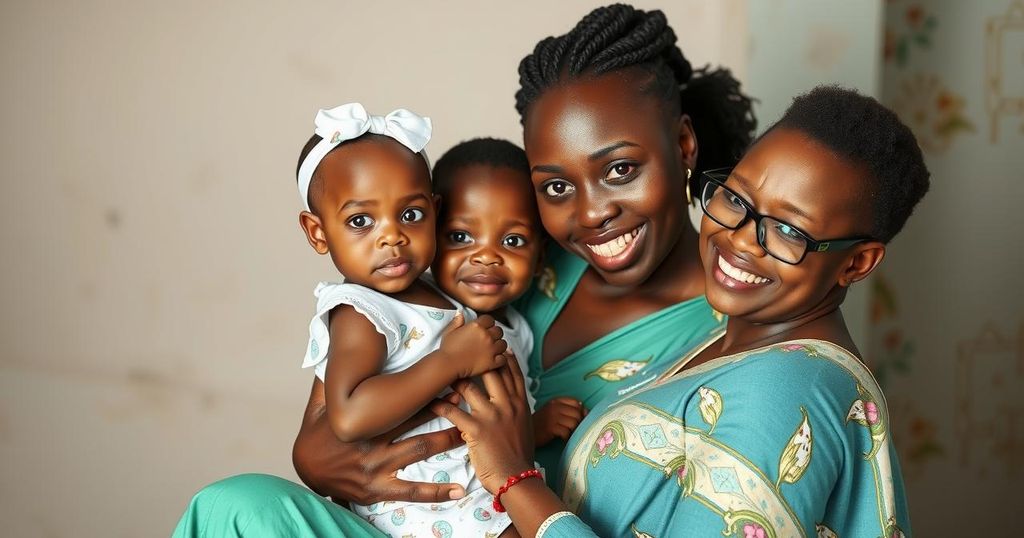Lifestyle
AFRICA, DEVELOPMENT, ECONOMIC GROWTH, FINANCING FACILITY, FOOD SECURITY, GENDER, GFF, HAJI, HAJIYA, HAJIYA A ' ISHATU, HEALTH, INTERNALLY DISPLACED PERSONS (IDPS, KADUNA, KADUNA STATE, NIGERIA, NIGERIA STATE HEALTH INVESTMENT PROJECT, NORTHEASTERN REGION, TUDUN - WADA, TUDUN WADA PRIMARY HEALTH CARE FACILITY, WORLD BANK
David O'Sullivan
0 Comments
Advancing Maternal and Child Health Care in Nigeria: A Collaborative Effort
In Nigeria, maternal and child health services are improving due to significant government and international initiatives aimed at reducing mortality rates. Programs such as the Basic Health Care Provision Fund have provided critical support to healthcare facilities, enabling free deliveries and essential medications. However, challenges persist due to funding gaps and economic constraints, necessitating ongoing commitment from both the government and international partners to ensure the health of women and children.
Hajiya A’ishatu, a shopkeeper from Tudun-Wada city in Gombe State, Nigeria, recalls her positive experiences at a local health facility during her deliveries. Her story reflects a national commitment aimed at improving maternal and child healthcare, particularly in underserved areas. Despite Nigeria having one of the highest rates of maternal and child mortality globally, initiatives such as the Basic Health Care Provision Fund have led to significant improvements. This program has strengthened nearly 900 healthcare facilities, providing essential services like free deliveries and essential medications to mothers and children.
Support from international organizations, including the Global Financing Facility for Women, Children and Adolescents (GFF) and the World Bank, has been crucial in piloting healthcare improvements in three states, ultimately expanding them nationwide. Between 2014 and 2020, the rates of safe deliveries increased significantly as immunizations for children tripled. Projects like the Accelerating Nutrition Results have also focused on the health of adolescents, providing crucial information about family planning and nutrition.
Despite the advancements, challenges persist, including funding gaps, staff shortages, and the economic downturn that has left many women unable to afford proper healthcare. Facilities like the Tudun Wada Primary Health Care Facility continue to face operational difficulties, with individuals opting for home births or traditional healers due to financial strain.
In response to these ongoing challenges, the Nigerian government has introduced the Nigeria Health Sector Renewal Investment Initiative, aimed at further reducing maternal and child mortality rates. The initiative seeks to align resources from various partners, including a recent $570 million project from the World Bank, that will provide essential funding for healthcare services in the most vulnerable communities. With these strategic investments, there exists a hopeful outlook for transforming Nigeria’s healthcare system and safeguarding the health of its women and children.
Nigeria faces a significant public health challenge, with maternal and child mortality rates among the highest globally. Over the years, the government has partnered with international organizations to improve health services, particularly in underserved regions. The establishment of funds and projects aimed at enhancing primary healthcare infrastructure has provided essential maternal and child health services, which remain crucial in addressing the disparities in healthcare access across the nation. A focus on adolescent health has also emerged as a critical component of these health initiatives, acknowledging the country’s large youth population.
Nigeria’s commitment to improving maternal and child health is evident through various initiatives and partnerships designed to enhance healthcare access and quality. While progress has been made, continued efforts are necessary to address the ongoing challenges in the healthcare system. The introduction of the Nigeria Health Sector Renewal Investment Initiative and its collaborative approach presents a promising direction for sustained improvements and potential lives saved.
Original Source: www.worldbank.org




Post Comment